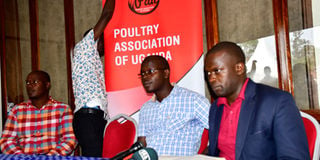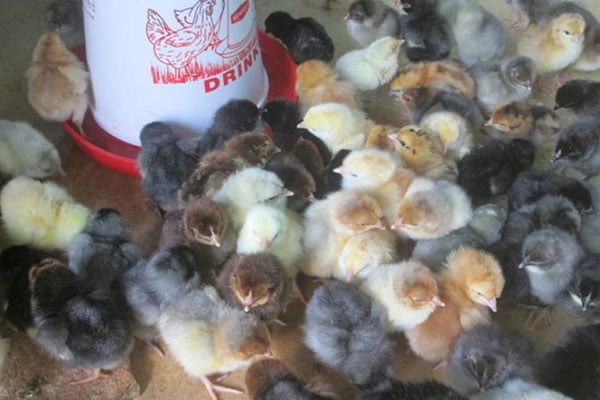Farmers warn of pork, chicken shortage amid row with URA

Poultry and pig farmers at a press conference in Kampala yesterday. PHOTO / STEPHEN OTAGE
What you need to know:
- Mr Richard Kirabira, who heads Wobulenzi Chicken City Poultry Farmers, an association of about 200 members, said they are currently finding a challenge of feeding their birds because of the high cost of maize and the poor quality of chicken feed sold in the market.
Poultry and pig farmers in Kampala, Wakiso and Luwero districts have warned of an impending shortage of poultry and pork products due to lack of feeds.
Addressing journalists yesterday, the different farmer associations, including the Poultry Association of Uganda, said they are failing to feed their animals because over the last three weeks, Uganda Revenue Authority (URA) has refused to release more than 500 trucks carrying premixes, which they use to produce animal feeds.
They said this has increased the cost of feeding the animals, hence forcing many farmers out of the business.
“We import our pigs from France so that we are able to supply good quality pork products to the market. Feeding one pig requires about Shs500,000 and we make a profit of Shs200,000 off a pig. When URA says we should pay 28 percent tax on the premixes, that means URA is taking all our profits,” Mr Christopher Mulindwa, the chairperson of the pig farmers, said.
Mr Richard Kirabira, who heads Wobulenzi Chicken City Poultry Farmers, an association of about 200 members, said they are currently finding a challenge of feeding their birds because of the high cost of maize and the poor quality of chicken feed sold in the market.
He said with the premixes which have been held by URA since September 17, they were feeding a chicken between three and four kilogrammes of feed for 32 days at a cost of Shs6,400.
But Mr Kirabira said because of inflation and the high cost of the dollar, their cost of production for a chicken has shot up to Shs8,600 even before the 28 percent new tax. He said the new tax, if implemented, will push them out of business.
“This means we shall have to sell a bird at Shs20,000 and a tray of eggs at Shs15,000 and we know our customers, no one is willing to pay more than Shs12,000 for a tray of eggs and Shs15,000 for a chicken. If URA doesn’t release our feeds, we want to tell the country that there will be no chicken and eggs in the coming weeks,” Mr Kirabira said.
But Mr Ibrahim Bbosa, the assistant commissioner for public and corporate affairs at URA, said they have given the importers of the premixes a 30-day window to bring in the concentrates as they engage farmers, Ministry of Agriculture and other stakeholders on the way forward.
He said dealers have been importing concentrates, which attract a 10 percent import duty unlike the pre-mixes, which are tax exempted under the East Africa external common tariff.
“They still have 10 days to go, and the last three days, the biggest three importers of the premixes have been cleared and if they are threatening scarcity, that will be artificial shortage; that is why we are asking Ugandans to start producing these products locally,” he said.
BACKGROUND
URA has communicated that they are going to start taxing animal feeds that are imported into Uganda in the form of concentrates. This is based on the premise that concentrates are not specifically listed among the exempt items in the VAT Act or the items that attract import duty at a zero rate under the East African Community (EAC) Common External Tariff handbook.




